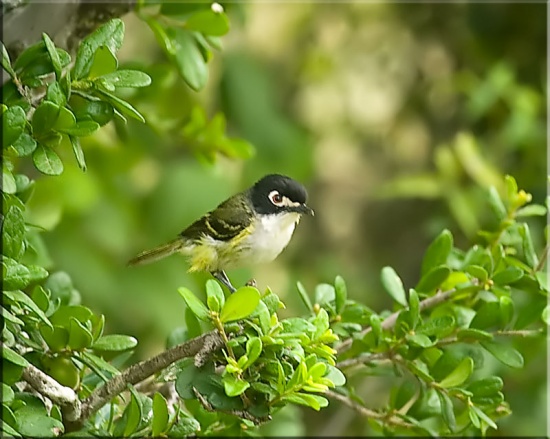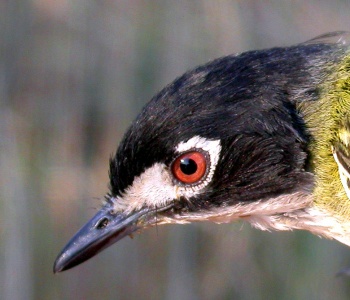(Photo of whole bird added. References) |
|||
| Line 1: | Line 1: | ||
| − | [[Image: | + | [[Image:Black-capped-Vireo3.jpg|thumb|550px|right|Photo by {{user|Lisa+W|Lisa W }}<br />Outside Fredericsburg, [[Texas]], [[USA]], June 2009]] |
;[[:Category:Vireo|Vireo]] atricapilla | ;[[:Category:Vireo|Vireo]] atricapilla | ||
| − | |||
==Identification== | ==Identification== | ||
12 cm<br /> | 12 cm<br /> | ||
| Line 11: | Line 10: | ||
*Partial white eye-ring and lores | *Partial white eye-ring and lores | ||
*Brownish-red iris | *Brownish-red iris | ||
| − | *Black bill | + | *Black bill<br /> |
| − | + | '''Female''' is duller with slate grey crown, greenish yellow underparts<br /> | |
| − | '''Female''' is duller with slate grey crown, greenish yellow underparts | ||
| − | |||
'''First year males''' are intermediate in colouration between adult males and females. | '''First year males''' are intermediate in colouration between adult males and females. | ||
| + | [[Image:18206BCVI_29Jun2006_OK_bf_1_JAG.jpg|thumb|350px|right|Photo by {{user|atricapillus|atricapillus}}<br />Wichita Mountains, [[Oklahoma]], June 2006]] | ||
==Distribution== | ==Distribution== | ||
[[Oklahoma]] to northern [[Mexico]]. Extirpated from [[Kansas]]. | [[Oklahoma]] to northern [[Mexico]]. Extirpated from [[Kansas]]. | ||
==Taxonomy== | ==Taxonomy== | ||
| − | This is a monotypic species. | + | This is a [[Dictionary_M-S#M|monotypic]] species<sup>[[#References|[1]]]</sup>. |
====Status==== | ====Status==== | ||
| − | The Black-capped Vireo is listed as an Endangered species by the U.S. Fish and Wildlife Service. Brown-headed Cowbird parasitism is a major problem. | + | The Black-capped Vireo is listed as an Endangered species by the U.S. Fish and Wildlife Service. [[Brown-headed Cowbird]] parasitism is a major problem. |
| − | |||
==Habitat== | ==Habitat== | ||
Scrublands with scattered clumps of shrubs, separated by open grassland. | Scrublands with scattered clumps of shrubs, separated by open grassland. | ||
| − | |||
==Behaviour== | ==Behaviour== | ||
====Breeding==== | ====Breeding==== | ||
| Line 33: | Line 29: | ||
====Diet==== | ====Diet==== | ||
The diet includes beetles and caterpillars. | The diet includes beetles and caterpillars. | ||
| − | |||
==References== | ==References== | ||
| − | Wikipedia | + | #{{Ref-Clements6thDec09}}#Wikipedia |
| + | {{ref}} | ||
==External Links== | ==External Links== | ||
{{GSearch|Vireo+atricapilla}} | {{GSearch|Vireo+atricapilla}} | ||
[[Category:Birds]][[Category:Vireo]] | [[Category:Birds]][[Category:Vireo]] | ||
Revision as of 23:15, 4 February 2010
- Vireo atricapilla
Identification
12 cm
Male
- Olive green above
- White below
- Faint yellow flanks
- Black crown and upper half of the head
- Partial white eye-ring and lores
- Brownish-red iris
- Black bill
Female is duller with slate grey crown, greenish yellow underparts
First year males are intermediate in colouration between adult males and females.
Distribution
Oklahoma to northern Mexico. Extirpated from Kansas.
Taxonomy
This is a monotypic species[1].
Status
The Black-capped Vireo is listed as an Endangered species by the U.S. Fish and Wildlife Service. Brown-headed Cowbird parasitism is a major problem.
Habitat
Scrublands with scattered clumps of shrubs, separated by open grassland.
Behaviour
Breeding
Both sexes build the nest laying 3-4 eggs which are incubated for 14-17 days. The female broods the young, with the male providing the food. The young fledge after 10 to 12 days
These birds can produce more than one clutch in the breeding season. The male tends some or all of the fledglings, while the female re-nests (this may be with another male).
Diet
The diet includes beetles and caterpillars.
References
- Clements, JF. 2009. The Clements Checklist of Birds of the World. 6th ed., with updates to December 2009. Ithaca: Cornell Univ. Press. ISBN 978-0801445019.
- Wikipedia
Recommended Citation
- BirdForum Opus contributors. (2024) Black-capped Vireo. In: BirdForum, the forum for wild birds and birding. Retrieved 4 May 2024 from https://www.birdforum.net/opus/Black-capped_Vireo





